Writing is art. Good writing is good art. Words have often been said to paint pictures. They do. They provide a connection between schemas we have already formed in our minds and what’s being communicated to us—in theory. Think of our brains as an unreliable Internet browser. We interpret code and display it for ourselves:
It gets a lot more complicated than this. Like I said, we’re unreliable. We are full of if-then statements: If you smell pine, then think of Christmas; if you think of Christmas, then remember a happy time; if you think of a happy time, then interpret it as either past, present, or future; if you think of past happiness, then feel sadness; if you feel sad, then drink . . .
This is the way we work. This is why art works. Some people are immune to it because they are coded differently, and we all interpret things in our own way because we are all using different browsers.
Why are we so drawn to the arts? We strive for connections, for greater meaning. This is why we create—to share how we see the world. And we need the help. This world is confusing: more beauty, joy, and happiness than we know how to deal with, but it’s juxtaposed against hatred, evil, and sadness. We search for a greater meaning in this mess.
This is why I create: why I wear the artist hat, why I write music, why I paint, why I write poetry, why I write this blog. Why. It is all about the why; to share meaning.
I feel this desire to make these connections and tell the people in the cave what I have seen, what I know.
This week, I wear the artist hat in its most widely understood meaning: the painter.
Those who know me well know that I have a strong spirit and a love for this world despite all that I know is wrong with it. I find the beauty in the dark. It glows and whispers to me, calling me forward to grab it, to hold it, and to know it. I give it a name, and I give it a voice.
I wrote this poem a few years back when I was lost. I stood firm holding tangled Jenga blocks, teetering and tottering above me, while something pulled at all of the wrong ones. I hurt. I always hurt. It’s the price I pay for always loving, for caring.
The tower of uncertainty and pain made me question my ability to open myself up again. Is the price of splendor paid by the temporary nature of everything of beauty—of the death of joy itself? It is. We know this. We live this. It is all around us:
"North Carolina"
Placed in a box
A favorite pair of jeans
Holes worn at the seams
A cup of coffee
Cold and black
Poured down the sink
At night
Searching the vaccuum bag
For your diamond earring
A rose stem
Put to my mouth
Brightly burning bud And I had to share it through more than words for all of the browsers that can't display it, so I painted it:
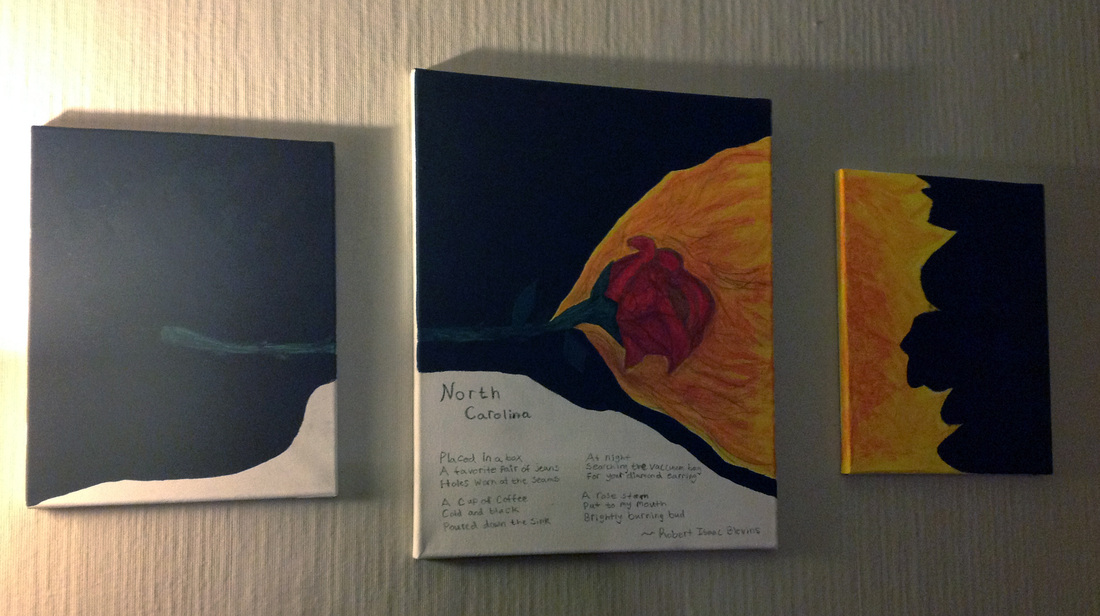 "Brightly Burning Bud" We find hope in the strangest of places. For me, it was the image of a rose, dying in a magnificent display.
 Tyler Stokes: Rockin' I got to the Brown Egg—Springfield’s best-kept secret when it comes to café-coffee shops—a little early, so I found a table and started going over my notes one last time. “Hey, how’s it going, man?” I peered up over the top edge of the papers in my hand to see Tyler Stokes hovering over the table. He’s young—early 20s—and he looks it. He was dressed like all of the other college kids there: blue jeans and a faded sweater. But he didn’t blend in. He never does; nobody else there could wear a smile the way that he does. It’s warm and genuine, and it makes you feel like he knows something about life that you don’t, and he does. He put his bag on the table, slid his coat around the chair next to me, and sat down. We chatted briefly about school, life, the weather—but I was eager to talk to him about his music, to find out why he smiles. He’s not at all what you would expect. My first impressions of Tyler happened while he was on stage with his guitar in his hand. His presence was impeccable. As soon as his fingers slipped around the neck of that guitar, he changed. He aged five years and then commanded the audience like he does his instrument, playing us all note by note. But at that moment, sitting across from me, he was just Tyler Stokes eating lunch and drinking a root beer out of a glass bottle.
| I’ve been fascinated with how musicians compose music, and Tyler writes all the music for Delta Sol Revival (DSR), a fresh band in the Springfield music scene. He’s been writing since he was 12. He wrote and recorded Drink to the Blues in his room when he was only 13. I know, I laughed when I heard the title, too. “My mom was like, ‘You can’t have it say drink,’ and I was like, it’s a blues album! It was the worst idea I ever had, but that’s the best part. You learn by failing—miserably.”
The idea that a 13-year-old would write an album with drinking in the title is laughable, but it does make some sense. After all, that’s when he started playing in bars around St. Louis. A few days after his fourteenth birthday, he got his first paying gig for $50, but it didn’t go to his head. Somehow, he still didn’t feel like he was anything special, just a kid getting paid to do what he loved doing.
|
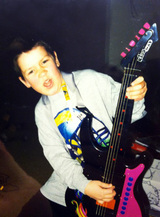
Tyler Stokes: Kid Rockin'
| It wasn’t until he brought a song he had just written over to his neighbor’s house, Devon Allman, son of Greg Allman of the Allman Brothers, that he realized that he had a knack for writing music, that he may just be something special. He put it in and played it for Devon:
[He] paused it after 30 seconds. “Here’s what you’re going to do: You’re going to start a band, and I’m going to produce your first record. You’re going to do this.” And I was like, heck yes, I’m going to do this!
And he did start writing music—all the time. In high school, he and his friends started a hobby band, Bucket of Truck. It was there that he first started developing his ability to write real songs for a real band.
Unlike some musicians, Tyler’s songs are based mostly on the music:
It’s usually always music first, or I come up with one phrase. I’ll just say a line. Or it’s, like, “dew-dewt, dew-dewt, dew, dew,” and sometimes it’s just really random: “I just ate some duck soup.” Or, something more general like, “I just want to love you.” And then it’s like, well, that sounds really good, so let’s just write a song about that line. […] Sometimes it comes from just playin’; I find just one rift that sparks and goes into another thing. […] I start with grooves a lot—that’s essential.
He writes anywhere and everywhere: his basement back home, a practice room, in the hallway before class, in his dorm room, while driving, etc. He puts a lot of his initial ideas on loose-leaf paper, but when it becomes tangible enough, he puts it all into his computer on GarageBand. He translates everything he hears in his head into parts—4 pieces, 5 pieces, 6 pieces—for his band to play: percussion, bass, guitar, keyboard, vocals, background, and high vocals. It’s a lot of work, but when he has it all together, he can hear if it’s a good idea or not. And then he takes it to his band members where they decide if it’s the right feel for their instrument and offer their creativity and professionalism to the process. If you haven’t ever written a song, you may be thinking that it’s a stagnant process where you sit down, drop a song, and flush, but, like most songwriters, it takes him weeks to fully write out a song and develop it, usually about 10 hours from start to finish. Only once has he pushed a song out in one sitting. He wrote it in the 30 minutes he had between classes, but, like all of his songs that I’ve heard, it turned out to be the type you don’t flush. It’s called “Shadows,” and it’s been played in St. Louis, Oklahoma City, and Nashville. This sort of thing sounds like it takes a lot of talent, and Tyler agrees, to a certain extent. To him, talent can only take you so far, and the rest is hard work and what you learn along the way: You get better at it, and you learn tricks of the trade, you know, things to do when you’re in a jam. You get to that time in a song, and it’s like, what do we do next? We can do this, you can put this chord there, you can go to the five, and it will always go back to the one.
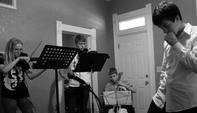 DSR: Practicin' I’ve known a lot of talented musicians, and, although musically capable, most of them don’t write their own music. And most of the musicians I know that write music, don’t like to play covers. It’s a weird delineation that happens within the term musician. For his part, Tyler attributes this to his lacking the skill set that some musicians have to tediously perfect a song line by line on their instrument, and he speculates, from his experience, that the ability to write a song comes from just doing it:
That’s the hardest part is to start a song. Once the song’s started, I mean, you’re good. Throw in a chorus, some lyrics on top of it, some ketchup, some mustard. You’re good; you’re done. It’s just those first ideas, and, also the confidence. It takes great confidence to write a song and play it, and that’s something I struggle with. I get so nervous every time I show a new song to my band—every time.
This isn’t to degrade any musician that doesn’t write music. Some musicians, as Tyler puts it, just want to focus on the art of musicianship, and there’s nothing wrong with that. The art of songwriting is just a different step in a different direction, just like poetry is a little different from technical writing or writing a blog—all of which are forms of writing. Songwriting defines meaning for words, chords, notes, and rhythm. It is the hypertext markup language of music. It takes a musician and a writer, both. This idea of assigning meaning to words for the audience to interpret can be a bit tricky for a songwriter . It’s Always Sunny in Philadelphia brings this up in the episode “The Nighman Cometh.” The gang writes a song with the line, “You gotta pay the troll toll if you want to get into that boy’s soul,” and the way that Frank sings it, it sounds like, “You gotta pay the troll toll if you wantto get into that boy's hole." This exact same thing happened to Tyler once: I kind of have a low, blues-zee voice, and when I say, “that use to rest inside of me.” I mean, I say inside of me, but the way I sing it, it just sounds like sodomy [laughing], so when you talk about inflections, I always think of that.
What does Tyler fear besides being chased out of a bar and being tarred and feathered by an angry mob for singing about sodomy? Snakes, of course. It’s not a coincidence that Satan took the form of a snake in Genesis. Seriously, they are clearly evil. But the greatest fears, the fears that drive us, come from within:
My fear since I’ve entered [songwriting] is not being the fullest person that I can and not using the gifts I’ve been given and the opportunities I’ve been given to the best of my ability. And being lazy. I don’t care if I’m successful or not as long as I know that I tried and I gave it my best. I know it sounds cheesy, but it’s really true. That’s how my family is […] Working is the easiest part.
The more I talked with Tyler, the more I realized that he is so much more than his smile, his band, or Tyler Stokes on stage. Each layer reveals more talents, gifts—and humility. His self-proclaimed hidden love is writing music for film, and he’s written music for three award-winning movies, one of which, The Barberless Barber, was bought by a French TV station; he co-wrote “There’s No Time” with Devon Allman, which will be on Devon’s album, Turquoise, scheduled for release on February 12, 2013; and he’s a full-time college student at Drury University, studying to become a music therapist (If you don’t know anything about music therapy, you should. Learn about it. This is the type of musician that chooses it as a major, if that tells you anything). But his band is his main focus right now. Delta Sol Revival is one of the top bands in town, Tag Magazine voted their song, “Play” the third best new song of 2012, and they are about to release their first professionally produced album this spring. Check out DSR on Facebook, follow them on Twitter, listen to some of their songs, find out where they’re playing next, and go watch them. You won’t be disappointed. Trust me: I’m not a doctor. He’s grounded, passionate, dedicated—and in more than just music or his music—and that’s why you’ll be seeing Tyler Stokes living the dream, or at least his meager version it: Where do I see myself, or where do I want to be because [laughing] those are two completely different things? A hot tub? Jumping on a trampoline? In five years, I just hope to be touring, playing music, making a sufficient amount of money, hopefully I have my girlfriend still there—that would be nice—and being able to tour the world and play music, and, hopefully having a couple people there to see it.
Wherever Tyler ends up, you can bet your bottom dollar that he’ll be out there making good music or doing good with his music—with a smile on his face . . .

DSR: Workin' the Crowd
When I am writing my music, I feel like I am communicating more clearly and louder than I ever have in my life. It is a fusion of the creativity of poetry and song, except that the words have a tone, an urgency, and an energy—a voice, my voice. There is no misunderstanding what I mean. It is a direct line to my soul; I am naked on a canvas. A true songwriter is a true artist, in this sense. I’m not famous, and I definitely don’t make money off of my music. Hell, I might not even be good at it—yet. The yet is the part that keeps me going in everything I do. I was raised to believe that I could do anything I wanted to do, and life has taught me that I can do most things that I want to do (I never got drafted into the NFL, shocker). Regardless, I approach obstacles as possible until proven otherwise. And, sometimes, the journey in being wrong can feel so right. I wrote my first song almost a year ago today. I’m a little late in the game, but my can-do-anything attitude got me learning guitar about two years ago, so it makes sense when you put it in the perspective of my talent timeline. I wrote it in the car. I was driving to Memphis with love on my mind. And I just started singing it. I slowly added more rhymes and structure to it. Then, I recorded what I had in a voice memo on my iPhone. I barely even killed anyone that night driving. Don’t worry. I was responsible and didn’t pull out my guitar until I got to Memphis. This is how my music generally comes to me. I need to be in the right place to where I can think of nothing but a feeling or an emotion. Sometimes, I get there without even realizing that I’m there, and, then, bam, something insistent comes to me, and it becomes a line in or title to one of my songs. The only time that I’ve been able to sit down and write a song without something nagging at me was when I decided to write a song for my momma for Mother’s Day. She is a different sort of inspiration altogether, I suppose. Mom’s do that to a guy. 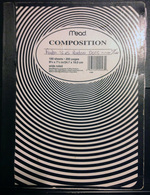 My songwriting book When I have an idea come to me, it ends up here, in my book. My handwriting is horrible, and the organization often has arrows going all over the place to move lines and verses around; writing is not a linear process, after all.
I would love to witness and document another person making music, and, yes, I know this would be the equivalent of tagging along on their wedding night to watch as their nuptials come to an intimate close. One day, I will get a chance to do this, and I will share it with you. Oh, and I want to watch some one write music, too . . . In the meantime, this is how I wrote “Mending Our Wall.”
The line, “The sun cannot set without mountains to hide” haunted my thoughts for a day or so. It has such beautiful imagery and meaning to it. It sparked the theme for this song, and it was the first thing I put to paper. You see, I was in one of those reflective states: I wasn’t on speaking terms with my best friend, and I wanted desperately to fix what was wrong between me and my ex-girlfriend so that she could still be a part of my life (I know, foolish. I’m a hopeless optimist).
| The thought that barriers keep us from light—happiness—drove me deeper. I was reminded of one of my favorite poems: Robert Frost’s “Mending Wall.” I wrote the next line, “A fence can be built without neighbors that mind,” and I immediately knew the title. The passively purposeful nature of my closest relationships at the time struck me as foolish. I wanted desperately to have that openness and comfortable honesty back in my life—and I knew that they did, too.
The music started coming to me at this point. I had recently learned D minor, and the chord kept coming to me. It said what I was feeling. I began alternating between D minor and A minor, and, naturally, I ended up in the key of C major. It took a few minutes to find the right progression and sequencing (Dm-Am-C-C-G-F-C), but when I played it, I felt warm for the first time in days. I was in sync with myself. I was being honest with myself, which made me realize that I was just as much to blame as they were. It’s easy to draw a boundary and say that the other side is wrong because they are separated from us.
We build our walls with guilt, shame, blame, fear, and pain, and we maintain these walls to keep these feelings from coming back toward us because we are terrified of holes, gaps, or cracks letting them back in. I started writing these things in columns so that I could work them into lines:
Excuse fills the gaps that keep us from shame
Guilt seeps through the cracks and causes us blame
Fear rushes holes to keep us from pain
But if you could see my side you’d see it’s the same I wrote the chorus next because I needed something to connect all of the untethered themes: We’re just building fences, stacking up rocks
Why don’t we let them fall?
We’re mending, mending our wall
Mending, mending walls This vision of a black iron rod being put into a fire—slowly warming it and pulling a glow from its dark figure—played out as a vision on repeat. If this dark metal can be bright, then what do we know? We choose the darkness. We are culpable: | 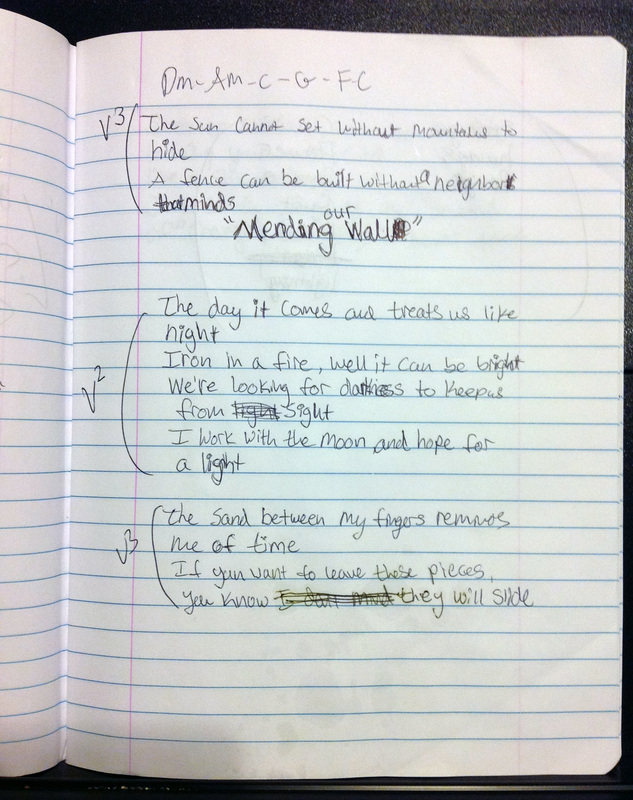 Right-hand page (recto)
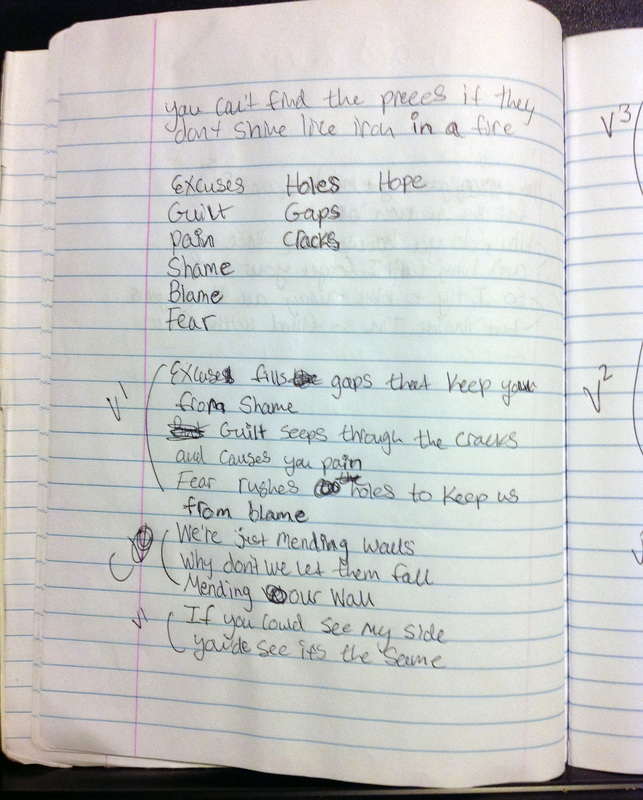 Left-hand page (verso)
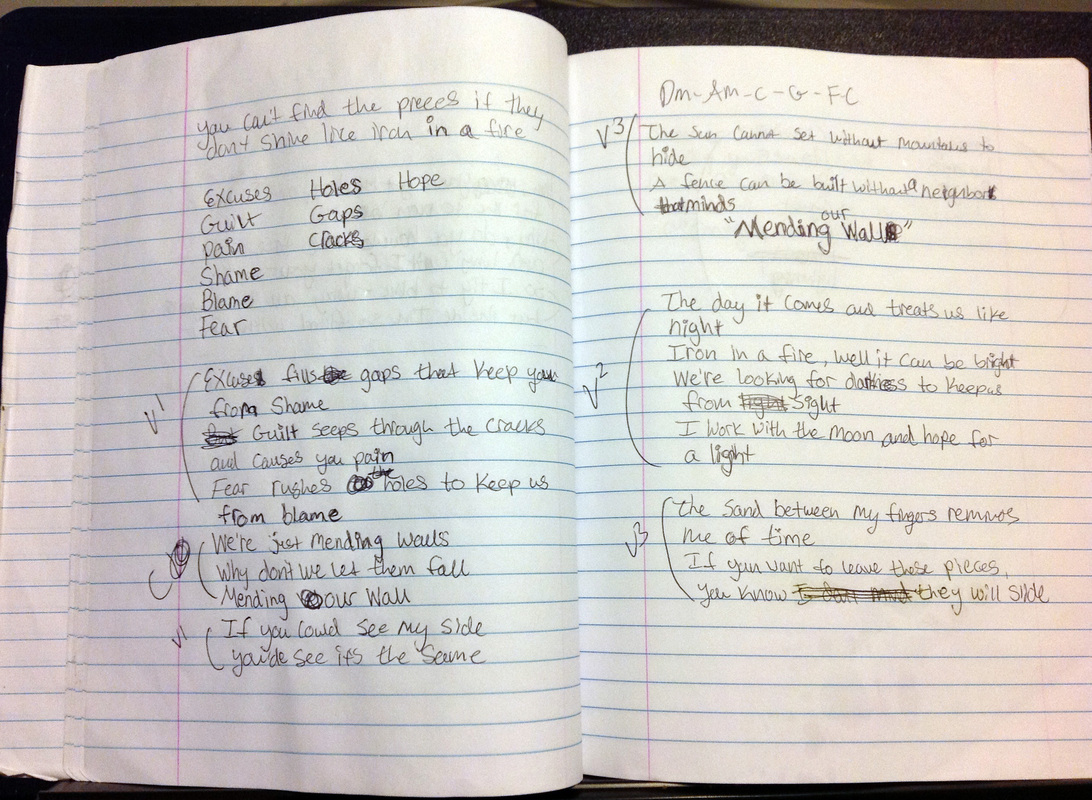 Both pages (spread) | The day it comes at treats us like night
Iron in a fire, well, it can be bright
We’re looking for darkness to keep us from sight
I work with the moon, and I hope for some light This led me—naturally—to the first lines I wrote. I had to do something with them. I felt an enormous weight of regret for my part in mending these walls, now that I knew them for what they were. I felt my mortality. YOLO, and I wanted to live for once. And I had hope and courage again. The artistic journey had brought me here: The sun cannot set without mountains to hide
A fence can be built without neighbors to mind
The sand between my fingers reminds me of time
If you want to leave the pieces, you know they will slide
I finished this song that very night, and the next night, I had my friend over to apologize over a beer. And, that week, I even texted to my ex . . .
Excuse fills the gaps that keep us from shame
Guilt seeps through the cracks and causes us blame
Fear rushes holes to keep us from pain
But if you could see my side you’d see it’s the same
We’re just building fences, stacking up rocks
Why don’t we let them fall?
We’re mending, mending walls
Mending, mending walls
The day it comes at treats us like night
Iron in a fire, well, it can be bright
We’re looking for darkness to keep us from sight
I work with the moon, and I hope for some light
We’re just building fences, stacking up rocks
Why don’t we let them fall?
We’re mending, mending walls
Mending, mending our wall
The sun cannot set without mountains to hide
A fence can be built without neighbors to mind
The sand between my fingers reminds me of time
If you want to leave the pieces, you know they will slide
We’re just building fences, stacking up rocks
Why don’t we let them fall?
We’re mending, mending our wall
Mending, mending walls
Mending, mending our wall
Sony Walkman Cassette Player: a black box the size of three iPhone 5s stacked on top of each other; a machine that tore through AA batteries like a US bank and government bailout money; and a portal into my love for music.
Welcome to the ‘90s. You weren’t cool if you didn’t have one clipped on to your blue jean shorts while you walked around chomping on some Big League Chew. I wasn’t cool. I was far from whatever cool meant, but I had one anyway, pulling down the waist of my hand-me-down denims to my thigh. I didn’t need to be cool; I had my escape—my music.
I remember that Christmas well. I found the present I had been looking for all morning, and I tore and ripped at the delicate red paper keeping it from me. I could feel the outline of that bulky, black beauty, and I had to have it--now. And then there was that hard, clear plastic wrapped around it tightly, showing me what was mine and mocking my desires. Scissors. I ran with them. I cut into it, and I pulled through the jagged edges around the mediocre opening I had made and touched my prize . . .
A tape. I needed a tape. Santa Clause had brought me the new Weird Al album, Alapalooza. I ran over to the pile that was my Christmas haul, and I grabbed it. What is the deal with all of this packaging? Nothing was happening fast enough for me. Finally. I slid it out and put it in my Walkman. Batteries. My flashlight didn’t need them anymore, so I shook them out and put them into my new toy. In the coming days, nothing would need its batteries except for my Walkman.
I pressed play, pulled apart my headphones, and put them over my ears: “Jurassic Park” blared through the headphones, and, suddenly, everything slowed down. Christmas kept happening around me, but I didn’t notice. For the first time in my life, I was in control of not only the sound around me but music, too. It felt powerful. Siblings arguing? Dad yelling? Nothing.
It’s not even close to my favorite Weird Al album, but it was my favorite escape. That’s where I met the Red Hot Chili Peppers. “Bedrock Anthem” was my favorite song on it, and I didn’t know it, but I was listening to my favorite band—kind of.
All of us kids loved Weird Al. We listened to him religiously, and it didn’t bother my religious parents. Did you know he made a movie? UHF, look it up. I still quote it around my siblings. He is the anthem of my childhood. And guess who has tickets to see him this April? This guy! Kid me, meet adult me. I hope you enjoy each other.
I do own quite a few hats, and I do have a hat for every occasion--my ball cap for when it's warm and I run, my beanies for when I run in the cold, my artistic-power cap (I've got a picture of me in this on here), my beanies that my ex-girlfriend knitted for me, etc., and that's as good a place as any to stop talking about my hats. You get the point. I own them: I wear them. I'm over it. If you haven't gotten it, yet, the hats are a metaphor, of course (not to insult your intelligence). I wear many hats. They are easy to change out. They fit the mood; they fit the task. I've never met someone like me--siblings excluded. I've always been a contradiction. Like an Alanis Morrisette song: I'm short, but I'm tall. I'm a geek, but I play ball. How many high schoolers do you know that have a job, are president of the chess club (a board one player), sing in choirs, play varsity football, and still have time to work for NASA? I mean, I did a lot more than that, and maybe I'll write about that sometime, but going on about it right now just sounds like bragging, so I’ll stop. If you want to know more, there is a good article about me published in Missouri State's FGB Times. The real point is that I enjoy my many talents, and I wear each hat with pride, knowing that I only get to wear it for a short time before it's time to change it out for another one. I wouldn't have it any other way. I was born with a lot of abilities, and this world doesn't get to tell me to pick just one or two for the rest of my life. I'm far too intelligent. Participate? Yes. Conform? No. This will be the theme for my blog. It is a record-keeping site for my self-development journey. I will explore who I already am and who I want to become. Some of the things you will have the chance to follow me doing are: writing more music and explaining the creative process behind what I’ve already written; learning Spanish, Italian, and French; reading new books; developing and enhancing my physical health through workout and diet; working toward professional goals; writing about language; learning to play piano; exploring Mother Earth; and exposing my world views through creative writing. These are just a few of the big ones. My interests are ever changing. If I can find the time, I want to learn to dance. I know that you’re asking yourself, “Rob, I’ve seen you dance. You are a machine. What do you mean?” I mean that if I am to become a real-life version of the Most Interesting Man in the World, I need to be able to tango, salsa dance, two-step, etc. I don’t take a superlative adjective like most lightly. I am the comparative adjective better than that. Read about it. Stay tuned this next week as I . . . (and the dot-dot-dots strike again).
I'm sure you're asking yourself . . . No, I'm not obsessed with hats. Ties, maybe. And yes, by the way, I did drop an ellipses in the first sentence of my first paragraph. I am bringing dot-dot-dot back. It existed way before Seinfield's "Yada-Yada" episode. That yada-yada crap doesn't come close to omitting quite the way that the dot-dot-dots do. You can also call them . . . s (that's the plural noun form for them in geek speak) or Ellipses. Seriously, it's so liberal and free in all the ways you can use it to omit information that it's basically European. Read a book. Or better yet, go to a favorite of mine and read online: Grammar Girl on the Ellipsis. I can't wait to have a girl tell me that she likes my . . . s, and I'd be willing to leave that open to interpretation . . . I've been told that the way I spell, use grammar, and write, the way that sentences drip out from me in units; in words; in letters; and punctuation marks onto a page or screen, slowly enticing you to want more--is a turn on. I once texted a former Latin classmate of mine in a tone that is legal marriage in some countries, and it was all in Latin, back and forth. Oro, playa! That's to speak, in Latin. If you get this last joke, I guarantee that you think that my writing is sexy. You think that intelligence is sexy. It is a trait that you seek for in a mate. My hat is off for you, my ladies. And if that idea doesn't scream sexy to you, you are either a.) a relative of mine, b.) one of the exes I no longer talk to, or c.) not interested in what a man does when he isn't wearing his hat Like all talents, not all knowledge is used for good. Sometimes it's French, sometimes it's Spanish. Sometimes it's Latin. Sometimes it's Nickelback (I just had to look up the spelling for them). I loathe their music so much. Seriously. They are a diluted, hear-no-evil concoction of talent and bad, at best. And at worst? Well, they are even worse when you watch their music videos, and do yourself a favor, or, better said, yet--if you still enjoy having a quiet place in your soul that is free of the resulting memory of such a damaging experience as watching their videos--go ahead, then--and don't watch them . . . The dot-dot-dot even fixes bad transitions. . . . Sorry, my dog just bombarded me for attention, This blog would have been completely different from here on out if she hadn't just distracted me. She's adorable, and she's a family dog. Not in the sense that most people would think by name alone, though. She's a dog with a big family. When I see my friends from St. Louis, they ask about her like she is their niece. When I lived with my brother and my sister in-law, they got to have her when I had work, school, or schoolwork, which was a lot. Now, they have visitation rights to her. I even have college friends that still ask about her. I'm talking early-20s friends. I'm surprised that most of these people remember that they had their early 20s. It's so bad that one of my friends from college thinks that the early 20s--as one collective unit--is a huge conspiracy, something that the government made up, and that's why it's so blurry . . . There, I did it again. You knew exactly what I had to say about that whole thing. I didn't even have to type it out. The point of that aside is that 2012 came and went. Most of us are still here and living today. I told you so. Everyone adores this dog. I am biased, but there are a whole lot of people that are biased toward my dog, too. That's how it is. She's a hat all of her own . . . And, that, my friends, is the best way to use the ellipsis yet--when It goes without saying.
|









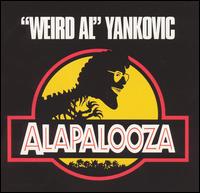
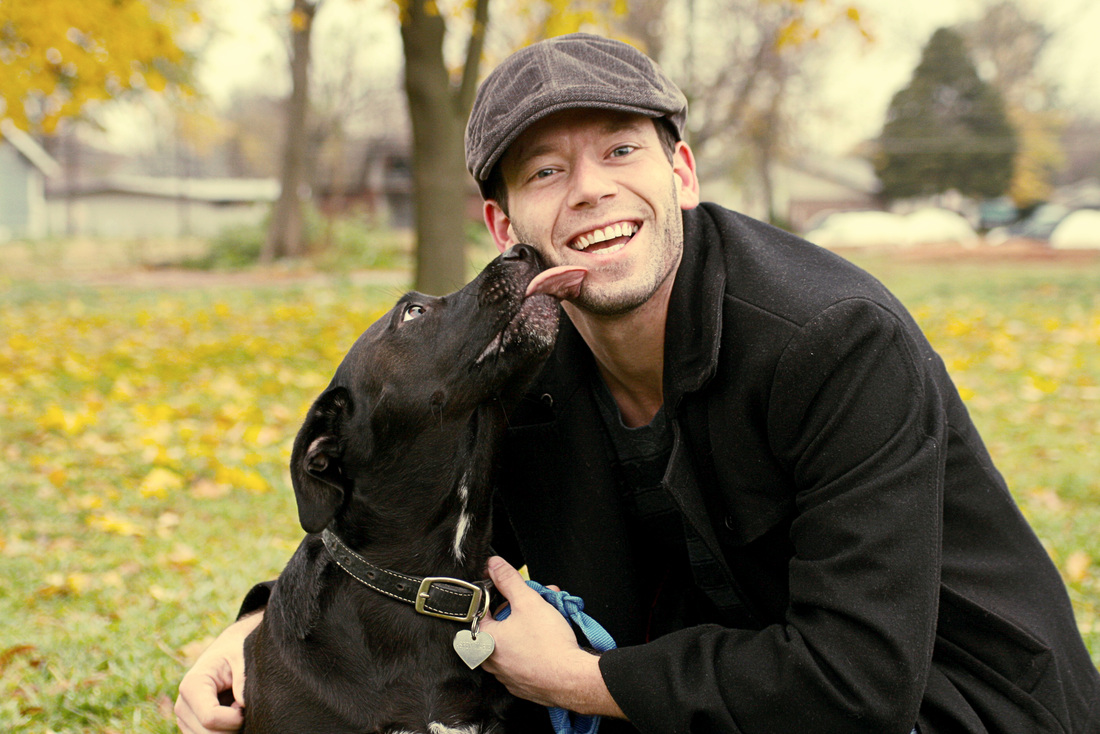
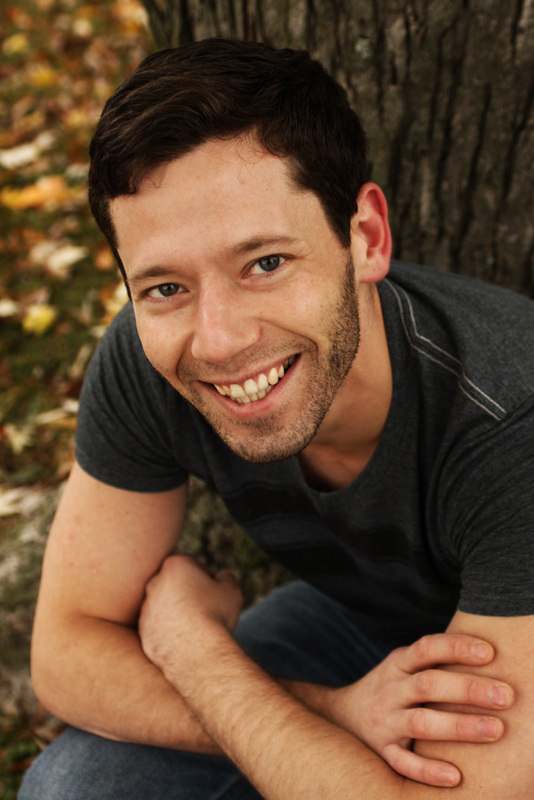
 RSS Feed
RSS Feed